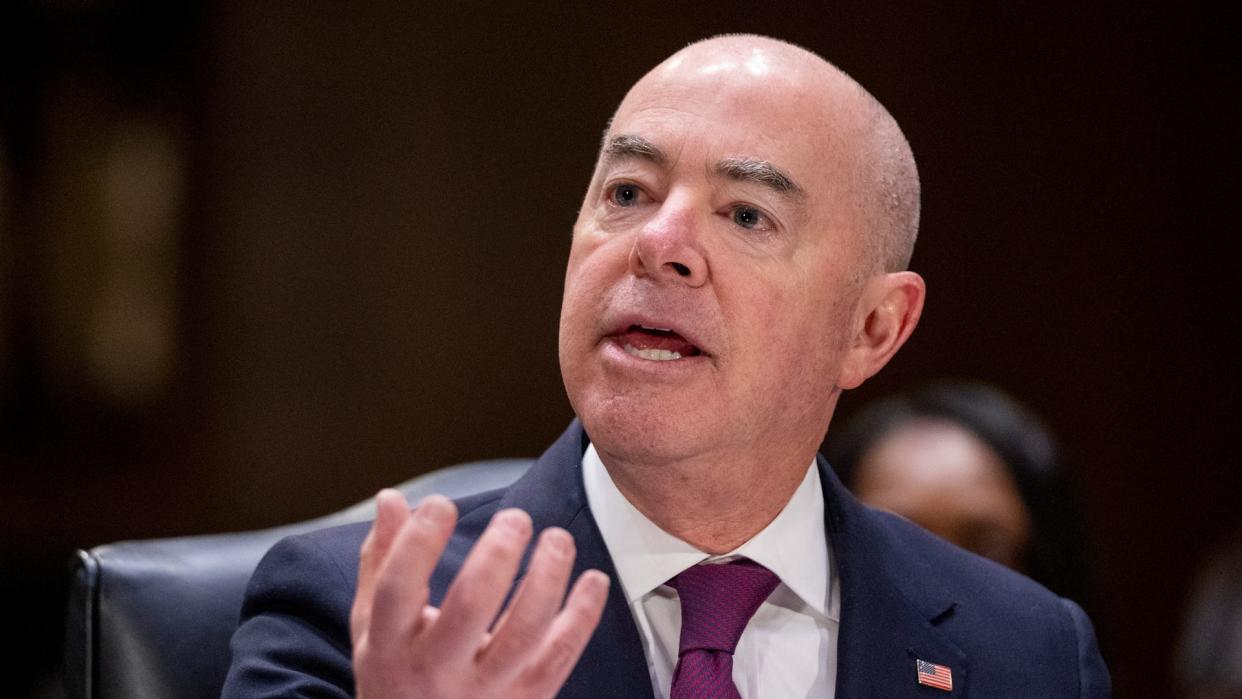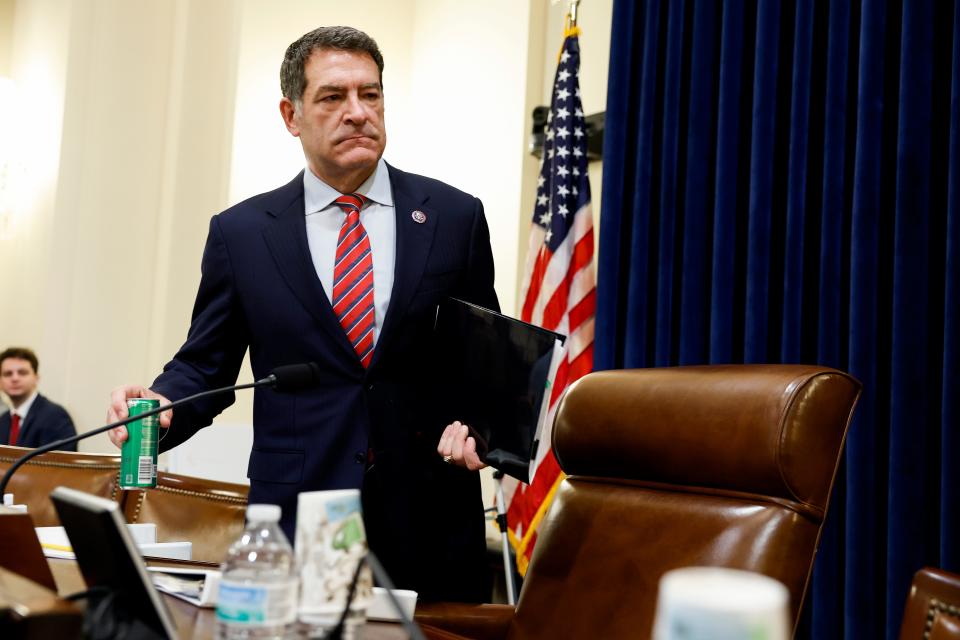What do articles of impeachment say Alejandro Mayorkas did or didn’t do?

- Oops!Something went wrong.Please try again later.
In the historic Feb. 13 impeachment of Alejandro Mayorkas, House Republicans said the Homeland Security secretary "willfully and systematically refused to comply with immigration laws" and "breached public trust" by falsely telling Congress the U.S.-Mexico border was secure.
This is the second time in U.S. history that a Cabinet member has been impeached; the first was in 1876, when Secretary of War William Belknap was impeached for taking kickbacks.
We reviewed what the articles of impeachment say Mayorkas did or did not do and found the articles misconstrued what is possible under immigration law and congressional appropriations.
Constitutional scholars, former Homeland Security secretaries and immigration experts have criticized the impeachment, saying the articles cite policy disagreements rather than impeachable offenses, which include "treason, bribery, or other high crimes and misdemeanors."
Refusing to comply with immigration law by not detaining people
House Republicans said Mayorkas "willfully and systematically" refused to comply with the law by refusing to enforce a detention mandate. This charge lacks context about the federal government’s capacity to detain migrants who cross the southern U.S. border.
Federal immigration law generally requires that people who enter the U.S. illegally be detained while they await court proceedings.
Immigrant detention can involve multiple federal agencies. People who are apprehended at the border are temporarily taken into custody by Border Patrol agents as they decide next steps. Some people are transferred from temporary border holding facilities to detention centers across the country operated by Immigration and Customs Enforcement.
But there’s not enough detention space for the large number of migrants who cross the southern border.
"Due to consistent and significant funding shortfalls … DHS has never had ‘sufficient detention capacity to maintain in custody every single person,’" U.S. Supreme Court Chief Justice John Roberts wrote in a 2022 opinion about the program known as Remain in Mexico.
In fiscal year 2023, Congress allocated money for immigration authorities to detain 34,000 people. That year, Immigration officials encountered migrants 3.2 million times — a number that represents events, not people. If one person tries to enter the country three times and is stopped each time by border officials, for example, that equals three encounters, even if it’s the same person.
Although immigration law requires that people be detained, courts have long debated whether people can be indefinitely detained, according to the Congressional Research Service.
Mounting backlogs of millions of immigration cases mean that court proceedings can take years to resolve. And not every country will accept its nationals who have been deported from the U.S.
So even if there were enough detention space, there probably would be legal challenges to holding people for extended periods.
Impeachment articles say Mayorkas made false statements to Congress

The impeachment articles also say, "Mayorkas knowingly made false statements to Congress that the border is ‘secure’ … and that DHS has ‘operational control’ of the border."
The missing context is that given the legal definition of operational control, no administration has ever achieved it.
Operational control is a legal term that was defined by Congress in the 2006 Secure Fence Act. The law tasks DHS with preventing all illegal entries into the U.S., including "terrorists, other unlawful aliens, instruments of terrorism, narcotics, and other contraband."
During an April 2022 House committee hearing, Republicans questioned Mayorkas about whether he had "operational control" of the border.
"Will you testify under oath right now? Do we have operational control, yes or no?" Rep. Chip Roy, R-Texas, asked Mayorkas during the 2022 hearing.
"Yes, we do," Mayorkas responded.
Roy read the 2006 legal definition of operational control and asked, "Do you stand by your testimony that we have operational control in light of this definition?"
"I do, and Congressman, I think the secretary of Homeland Security would have said the same thing in 2020 and in 2019," Mayorkas responded.
Roy switched discussion topics before Mayorkas could elaborate.
Last March, U.S. Border Patrol Chief Raul Ortiz told a House committee that the Biden administration did not have "operational control" over the southern border. Soon after, Senate Republicans pressed Mayorkas to assess the issue again.
"Do we or don’t we?" Sen. Lindsey Graham, R-S.C., asked Mayorkas.
Mayorkas said when gauging operational control, he does "not use the definition that appears in the Secure Fence Act."
"So the way I define it is maximizing the resources that we have to deliver the most effective results, and we are indeed doing that," Mayorkas said.
Impeachment uses program termination as evidence; Supreme Court signed off
House Republicans said Mayorkas "breached the public trust" by refusing "to control and guard the boundaries and borders of the United States against the illegal entry of aliens."
As evidence, the articles of impeachment cite Mayorkas’ termination of Migrant Protection Protocols. The Trump-era program, also known as Remain in Mexico, sent some migrants seeking asylum back to Mexico to await immigration court proceedings.
Mayorkas ended the program. However, the U.S. Supreme Court ruled that ending it did not violate immigration law.
House Republicans cited a lower court’s ruling forcing Biden to restart the program as evidence that Mayorkas failed to fulfill his duty to secure the border, and said that ending the program increased illegal immigration. But the impeachment articles don’t acknowledge the Supreme Court’s decision that allowed the program to end.
Also, the nonpartisan Migration Policy Institute has raised doubts about the program’s effectiveness at lowering illegal immigration.
Our sources
House Committee on Homeland Security, "Articles of Impeachment for Homeland Security Secretary Alejandro Mayorkas," Jan. 28, 2024
PolitiFact, "Chris Christie’s math on apprehensions and detention space is mostly right, but omits context," Oct. 20, 2023
PolitiFact, "Ask PolitiFact: What is ‘operational control’ at the border and do cartels have it?," March 3, 2023
PolitiFact, "GOP claims that Homeland Security secretary is ‘responsible’ for fentanyl crisis are False," Feb. 12, 2024
PolitiFact, "Ask PolitiFact: Can Joe Biden ‘shut down the border’ on his own?," Feb. 2, 2024
PolitiFact, "Ask PolitiFact: What branch of government is ‘really’ responsible for the crisis at the border?," Jan. 17, 2024
PolitiFact, "Explaining the Supreme Court immigration ruling on ‘Remain in Mexico’," July 7, 2022
PolitiFact, "As Chinese immigration to U.S. rises, Republicans and Trump use ‘military age men’ scare tactic," Feb. 7, 2024
U.S. Senate, "Impeachment Trial of Secretary of War William Belknap, 1876," accessed Feb. 14, 2024
Roll Call, "Republican senators grill DHS chief over border security," March 28, 2023
Just Security, "Constitutional Law Scholars on the Impeachment Proceedings Against Secretary of Homeland Security Alejandro Mayorkas," Jan. 10, 2024
The Hill, "Ex-DHS secretaries from both parties say they oppose Mayorkas impeachment," Feb. 6, 2024
The Unpopulist, "Secretary Mayorkas Is Being Impeached for Following the Law on Border Enforcement," Feb. 7, 2024
State Department, "Suspending and Terminating the Asylum Cooperative Agreements with the Governments El Salvador, Guatemala, and Honduras," Feb. 6, 2021
Congressional Research Service, "The Law of Immigration Detention: A Brief Introduction," Sept. 1, 2022
U.S. Immigration and Customs Enforcement, "Detention Management," Feb. 1, 2024
U.S. Immigration and Customs Enforcement, "Detention Facilities," March 30, 2023
U.S. Supreme Court, "Biden v. Texas," June 30, 2022
U.S. Customs and Border Protection, "Nationwide Encounters," Feb. 13, 2024
C-SPAN, "Department of Homeland Security Oversight Hearing," April 28, 2022
Congress, Secure Fence Act, Oct. 26, 2006
House Homeland Security Committee, "Homeland Security Committee Field Hearing to Examine Secretary Mayorkas’ Border Crisis ‘By Design’," March 14, 2023
C-SPAN, "Secretary Mayorkas Testifies at Homeland Security Oversight Hearing," March 28, 2023
Migration Policy Institute, "Court-Ordered Relaunch of Remain in Mexico Policy Tweaks Predecessor Program, but Faces Similar Challenges," Dec. 2, 2021
Cornell Law School, "Offices Eligible for Impeachment | U.S. Constitution," accessed Feb. 15, 2024
This article originally appeared on Austin American-Statesman: What House articles of impeachment allege Mayorkas did or didn't do

